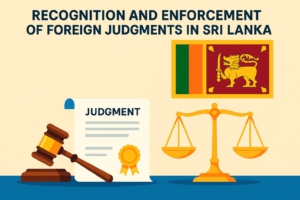Legislative direction for recognition of foreign judgments in Sri Lanka: A new sign-post in the private international law landscape
This post was written by Rose Wijeyesekera, Professor of Private and Comparative Law, Chair / Department of Private and Comparative Law – Faculty of Law, University of Colombo

Introduction
Sri Lanka (formerly known as ‘Ceylon’) is an island in the Indian Ocean, and is home to a total population of 21,763,170, consisting of Sinhalese 74.9%, Tamils 15.4%, Muslims 9.3%, and 0.5% consisting of others such as Veddhas, Burghers, and gypsies.The legal system of this island nation is a unique blend of native laws and the laws that were placed by the colonial powers from 1505 to 1947, when the country gained independence. Since then, Sri Lanka has been a democratic republic and a Unitary State governed by a constitution. The Sri Lankan legal system is primarily based on Roman-Dutch law, inherited from its colonial past under the Dutch, and English common law introduced by the British colonial rulers. Apart from these two, the legal system incorporates elements of Kandyan law (representing indigenous customs of the Sinhalese), Tesawalamai(customary laws of the Tamils of the Northern province of the country) and Muslim law. These personal laws apply in matters of personal law, such as marriage, divorce, and inheritance, depending on the community to which an individual belongs. All Muslims including the sub-categories such as Moors and Malays, are governed by Muslim Law in their personal matters, while Kandyan Sinhalese (a minority of the Sinhalese who hail from “Kandyan Provinces” / the hill country, are governed by Kandyan Law. These customary laws bear a territorial and/or a religious nature. Most of these laws are enacted, but some remain open leaving room for judicial interpretation. The court system in Sri Lanka is structured hierarchically and is designed to ensure justice through a combination of traditional and modern legal principles. The system comprises the Supreme Court at the apex, the Court of Appeal, Provincial High Courts, District Courts, Magistrate Courts, and tribunals such as Labour Tribunals, Quazi Courts, and Mediation Boards. Read more
